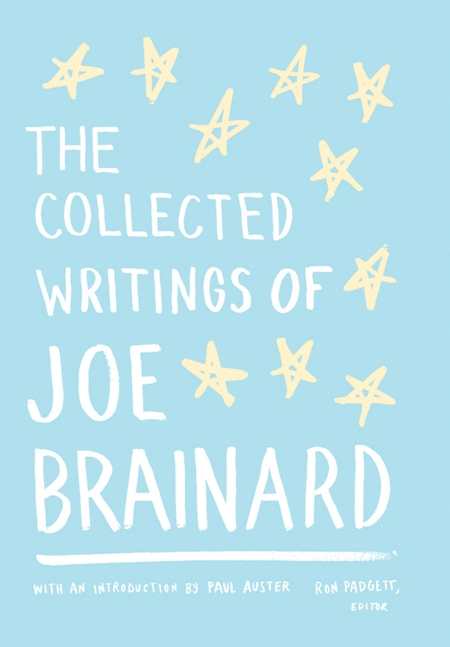The Collected Writings of Joe Brainard
When Joe Brainard died in 1994 at age 52, he not only left behind a considerable legacy as a visual artist—his primary vocation—but also as a writer. Despite this fact, he had actually quit working in both arenas a full fifteen years earlier, deciding to focus on “life as art” instead. His impressive collected written works, edited with unstinting care by his lifelong friend, the poet Ron Padgett, contains, among other things, the affecting autobiographical work “I Remember,” with perceptive, memorable passages such as this one: “I remember Frank O’Hara’s walk. Light and sassy. With a slight bounce and a slight twist. It was a beautiful walk. Confident.” There are also quirky plays, unclassified short prose pieces, and even some drawings and notes to himself. In almost every case, the writings are characterized by the artist’s self-effacing yet total certainty that he is an artist and that the art he makes is important, even “great.” His is not a conceited sort of confidence but a way of taking his own calling and talent seriously. For example, in a particularly affecting “Self-portraits” he writes, “But though I know beauty, I can’t express it until I’ve undressed. Have so much undressing to do.”
While the forms in this collection vary, and are characterized by the avant garde sensibility of the late 1960s and 1970s, what these pieces have most in common is a fresh, unaffected, and totally unique point of view: that of a young and very talented gay man from Tulsa who moves to New York, and for a time to Boston, where he takes up with the likes of Ted Barrigan, John Ashbury, Kenneth Koch, and Alex Katz. Brainard was an artist and tastemaker in his own right, but was very much in the mix with the luminaries of the era, the abstract expressionists and members of the New York School of poetry, in particular. Part of the pleasure of this book is the way it transports us to that vital period in American art and culture, allowing us to know some of its pivotal characters through Brainard’s eyes and experiences, which is to say, not as objects or larger-than-life personalities, but as his closest friends and collaborators.
Here is a sort of variety show in text, what with the way we are treated to the varied impressions, formal approaches, and the insides of his heart and mind, all of which are offered with striking frankness. While most of the time this is interesting, there are also instances in which one marvels at the way his diary entries, in particular, can be so pointless. After all, do we care what he ate for breakfast and whether or not he remembered to take his vitamin B pill? His hard-core fans will relish the breadth of detail here, which other readers will pass over. And yet they will be very glad to get to know this man who cries because the sky is beautiful and who loved, most of all, other people; a man whose life and writing reflect a rare tenderness toward others, whom he wished very much to please with what he created.
Reviewed by
Holly Wren Spaulding
Disclosure: This article is not an endorsement, but a review. The publisher of this book provided free copies of the book to have their book reviewed by a professional reviewer. No fee was paid by the publisher for this review. Foreword Reviews only recommends books that we love. Foreword Magazine, Inc. is disclosing this in accordance with the Federal Trade Commission’s 16 CFR, Part 255.

